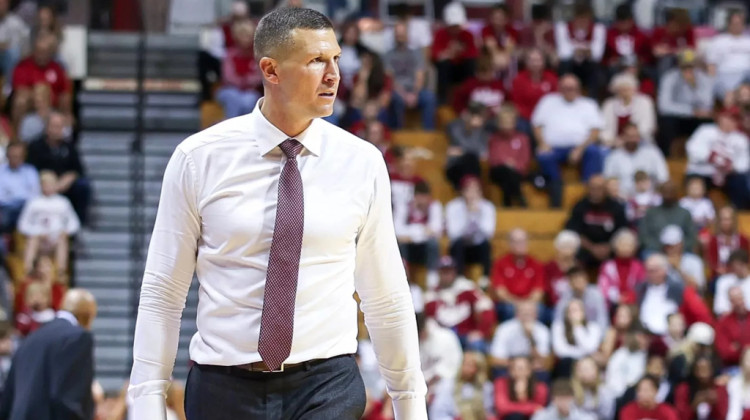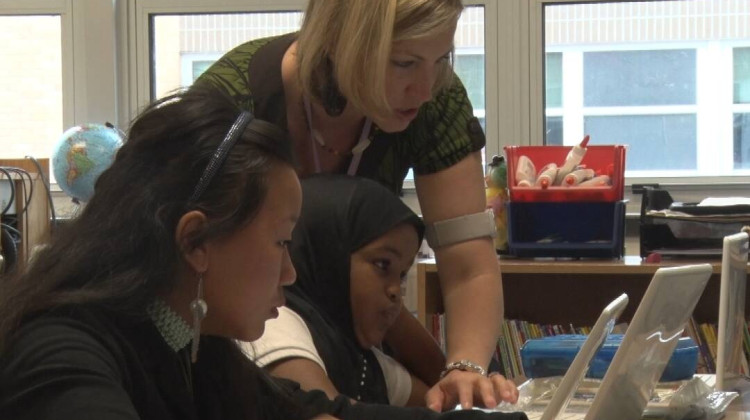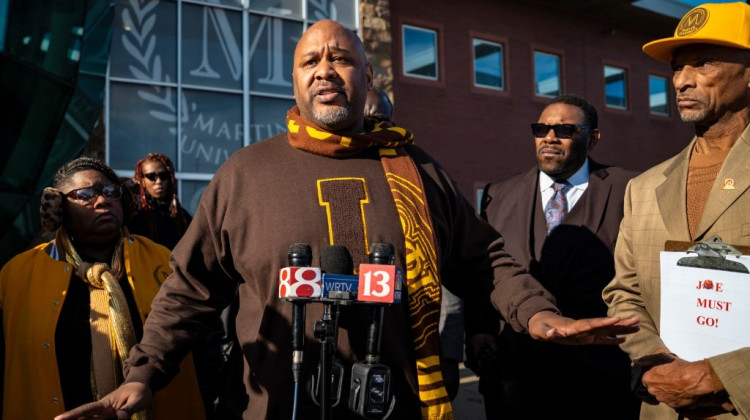
Corban, a 15-year-old at Riverside High School, said he got vaccinated because he didn't want to have to quarantine and miss school.
(Elizabeth Gabriel/WFYI)By Carter Barrett and Elizabeth Gabriel
Kids are finally back to in-person school, but the COVID-19 pandemic continues to disrupt learning. Cases are on the rise due to the highly contagious delta variant, which has also increased the number of youth hospitalizations.
Despite the surge, the vaccination rate for eligible children remains low. And a new study shows that it may not increase.
Approximately four in 10 parents will only vaccinate their children if required, according to the new survey from Indiana University Purdue University Indianapolis. Researchers surveyed more than 10,000 Indiana caregivers, with respondents from nearly every county in the state.
It paints a grim picture of the future of the pandemic: the delta variant spreading across the country and landing more children in emergency rooms, all while the efficacy of vaccines appears to be waning.
“Are we going to see more breakthrough infections because of this? That's my biggest fear,” Thomas Duszynski, a public health expert from IUPUI, said. “That's why I look at the data and say we are not going to get through this until we can vaccinate and protect that younger population.”
However, evidence is clear that the COVID-19 vaccines still offer significant protection against hospitalization and death. As the pandemic rages on, it’s evident that children are at risk.
More than 21 percent of the new cases reported in Marion County on Tuesday were from individuals ages 19 and younger. Throughout the month of August, cases in individuals ages 19 and younger accounted for nearly 30 percent of the state’s total number of new cases.
“It's very clear that COVID does infect children,” Dr. Sarah Bosslet, a pediatrician at Riley Physicians Pediatrics, said. “We realize that much more now, even than we did eight weeks ago.”
Differing Perspectives
Corban is a 15-year-old sophomore at Riverside High School, an Indianapolis charter school. At Riverside, students who have been in contact with someone who tests positive for COVID-19 don’t have to be quarantined if they’re vaccinated and don’t have symptoms. That’s one of the reasons why Corban got the vaccine.
“Just so that I can stay in school longer,” Corban said. “So that way I don't have to get quarantined when everyone else does. And I mean, it's just important to get it so that we can keep the whole community safe.”
But getting youth vaccinated hasn’t been easy.
Breanna, a 15-year-old junior at Mooresville High School, got her first dose of the vaccine a few weeks ago. She said she wasn’t able to get the vaccine until recently because of her schedule.
“I have very busy summers,” Breanna said. “I do 4-H projects, I do 4-H camps and I went to CIY [Christ In Youth]. So between all of those, I couldn’t have made the three-week shot follow-up.”
Breanna said she thinks only a small percentage of youth are getting vaccinated because a lot of kids are still hesitant about the COVID-19 vaccine.
“I feel like more people have gotten it as 18 year olds because a lot of us have also been sitting back, making sure there's no large reactions happening,” Breanna said. “Because it just got released for us a couple months ago. I can't speak for everybody, but I feel like it's been at least 25 to 30 percent.”
Her estimate is spot on. Indiana youth have the lowest COVID-19 vaccination rates compared to other age groups in the state — just 28 percent of 12-15-year-olds are fully vaccinated.
Older teenagers have been less hesitant — 38 percent of 16-19-year-olds are fully vaccinated. Overall, 53 percent of eligible Hoosiers are fully vaccinated.
Some parents continue to be hesitant about letting their children get the vaccine.
Elizabeth is the mother of three teenagers, two of them are public school students in Madison County. We’re using her middle name to protect her privacy. Since she and two of her children had COVID-19, she thinks their antibodies are stronger than the vaccine — despite research that has proven otherwise.
“If adults want to get vaccinated, they should if they're afraid of it or they think that they need to protect themselves for whatever reason,” Elizabeth said. “Because I think it does make sense for a lot of people. I’m very happy that my parents are vaccinated; I think it's definitely a smart move for them. But you know, when it comes to the kids, I just think that there's other factors.”
Elizabeth said she is hesitant due to the limited amount of research on the vaccine and concerned about the negative impacts scientists might discover as the research continues. She is concerned about the possibility of children having severe long-term side effects from the vaccine.
But health officials have said, so far, there haven’t been any long-term effects from the vaccine.
“If there is truly anything to herd immunity, and the children don't get the symptoms that are as severe, then why don't we allow them to get the virus — almost like chicken pox parties back in the day — and just make sure that any adult that is uncomfortable is vaccinated?” Elizabeth said.
But according to experts, that isn’t the most efficient way to reach COVID-19 immunity.
Melissa McMasters, administrator of the immunization and infectious disease program for the Marion County Public Health Department, said parents shouldn't risk exposing their children through herd immunity. Emerging evidence suggests the delta variant can cause more severe illness in children compared to the original strain of the virus.
“The bottom line is you can't do that because you're going to put special children at risk — those that have underlying conditions, those that don't know they have underlying conditions,” McMasters said. “And we've even seen COVID really causes significant illness in kids with no underlying condition.”
Different Buckets
Indiana is seeing the impact of the delta variant on children. Riley Hospital for Children has had record-setting numbers of positive cases in patients recently, and children are being transferred to the Indianapolis-based hospital from around the state.
“The bottom line, in the emergency department, we're seeing record volumes,” Associate Chief Medical Officer Dr. Brian Wagers said. “We've broken our record over the last couple of days for 24 hours, a couple of times.”
As of Wednesday, 15 children are hospitalized at Riley, and six are in the ICU.
That’s why Bosslet, the Riley pediatrician, said discussing the COVID-19 vaccine has become a constant part of her day — answering questions, dispelling misinformation and directing people on how to get vaccinated.
Bosslet said there are several buckets people fall into — the largest is parents that just have questions. Then there are the families that have struggled to find the time.
“You have a small but vocal group who, even when you say the word ‘COVID,’ they bristle and you know that you're not going to get anywhere,” Bosslet said. “But the vast majority are in that middle section where they've heard all this information, they're overwhelmed by it, they're trying to sort through it and figure out what the truth is.”
As the recommendations around school protocols, mask wearing and safety guidance quickly changes it’s difficult for parents to keep up.
On Wednesday, the Indiana Department of Health eased its school quarantine policy and now close contacts of someone who tested positive for COVID-19 do not need to quarantine if they are asymptomatic and if everyone in the classroom was wearing a mask. The announcement came as Indiana schools have reported record-breaking numbers of COVID-19 cases.
“Part of the difficulty has been that the landscape keeps shifting so dramatically from moment to moment,” IUPUI researcher Gregory Zimet said.
However, Zimet said changing recommendations are positive — it means science is adapting to new information.
Long-Term Stakes
Indiana’s low COVID-19 youth vaccination rate stands in contrast to the state’s overall successful childhood vaccination rates for other illnesses — like measles or polio. Statewide, there’s a 70 percent completion rate for childhood immunizations, but many counties have rates above 80 percent.
Decades of research have shown effective strategies to increase vaccination rates, but COVID-19 poses a unique set of challenges.
McMasters said that’s why the county public health department has focused on reaching out to parents who are on the fence as opposed to those who don’t want the vaccine at all.
“If you're someone who's completely anti-vaccine, there's probably nothing I can say that can make you change your mind,” McMasters said. “So we really focus on those people that are kind of on the fence and say, you know, ‘What questions do you have? What concerns do you have?’ And identifying and talking with people on a one-to-one level instead of just mass messaging can be helpful in some instances.”
Public health experts fear delta will continue to ravage its way through schools, and the virus will continue to mutate until the vaccine becomes less effective.
“When I look at that data, I see that we are not going to get through this pandemic, without being able to vaccinate younger populations,” Duszynski, the public health expert from IUPUI, said. “In other words, we have a whole susceptible population that can still spread disease.”
Contact WFYI education reporter Elizabeth Gabriel at egabriel@wfyi.org. Follow on Twitter: @_elizabethgabs.
Contact Side Effects reporter Carter Barrett at cbarrett@wfyi.org. Follow on Twitter: @carter_barrett.
 DONATE
DONATE






 View More Articles
View More Articles



 Support WFYI. We can't do it without you.
Support WFYI. We can't do it without you.